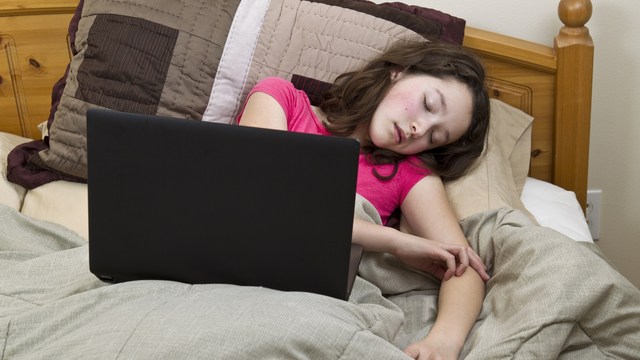 Tom Baker/PhotoSpin
Tom Baker/PhotoSpin
Electronics and technology make life simpler in many ways, but when it comes to sleep we could do without the distraction and light of our cell phones and tablets.
As part of Sleep Awareness Week from March 2-9, 2014, the annual Sleep in America poll was released on March 4. The results provide evidence that electronics actually can harm the sleep quality of children.
For example, statistics show that children ages 6-17 who leave specific electronic devices on during the night such as a television, tablet, smartphone and music player or radio, sleep less on average during school nights than children who don’t keep devices on. Parents who responded to the survey gave estimates of average sleep times for their children.
Children who at least sometimes leave smartphones on during the night only sleep an average of 7.4 hours, compared to 8.3 hours for children who don’t have the devices turned on.
The poll focuses on sleep quality in families, and more specifically the sleep quality of parents and their children. A major section of the poll was dedicated to technology’s impact on children’s sleep quality.
Another important finding was that besides the number of hours of sleep decreasing due to electronics use, the sleep quality of children also decreased, according to their parents.
It was estimated that of the children who sometimes have a television on at night, 18 percent had fair or poor sleep quality, 50 percent had good sleep quality, and 31 percent had excellent sleep quality.
Among children who always had the television off or not in the room, only 8 percent had poor sleep quality, 47 percent had good sleep quality and 45 percent had excellent sleep quality.
So why are electronics causing children to sleep less? Besides the obvious distraction (children are engaged in an activity instead of sleeping) electronics can also interrupt our body’s natural functioning due to the light the screens emit at night.
According to the National Sleep Foundation, light from electronics sends alert signals to our brains that keep them awake. Electronics give off a special light, called blue light, that our circadian rhythms are especially sensitive to, and this in turn causes melatonin to be released slower in our bodies.
The Foundation suggests keeping electronics turned off an hour before bedtime to counteract the negative side effects.
So what are the consequences of losing extra sleep due to texting late at night? Besides just feeling drowsy, sleep loss and deprivation can have both physical and mental health side effects.
Parents seem to know this as well. In the poll, 55 percent stated that sleep was extremely important for their own mood, and 61 percent stated that sleep is extremely important for their child’s mood. In addition, 63 percent of parents believed that sleep is extremely important for their own health and well-being, and 66 percent believed the same for their children.
According to the American Psychological Association, excessive sleepiness can lead to moodiness, irritability, and reduced self-control. Severe sleep deprivation could lead to apathy, slower speech, memory impairment, dull emotional responses and limited multitasking abilities.
Harvard Health Publications adds that sleep deprivation and sleep problems can also be linked to mental health disorders like anxiety, depression, bipolar disorder and attention deficit hyperactivity disorder, as well as sleep disorders like insomnia.
Do you use electronics at bedtime? How does it affect your sleep and mood? Have you adjusted your electronics use at nighttime to get better sleep? Share your stories in the comments section.
Sources:
National Sleep Foundation. National Sleep Foundation 2014 Sleep in America Poll Finds Children Sleep Better When Parents Establish Rules, Limit Technology and Set a Good Example. Web. March 3, 2014.
http://sleepfoundation.org/media-center/press-release/national-sleep-foundation-2014-sleep-america-poll-finds-children-sleep
National Sleep Foundation. Sleep in America Poll 2014: Sleep in the Modern Family. Web. March 3, 2014.
http://www.sleepfoundation.org/sleep-polls-data/sleep-in-america-poll/2014-sleep-in-the-modern-family/ (Powerpoint: slides 37, 15, 8)
American Psychological Association. Why sleep is important and what happens when you don’t get enough. What are the signs of excessive sleepiness? Web. March 3, 2014.
http://www.apa.org/topics/sleep/why.aspx?item=2
Harvard Health Publications. Harvard Medical School. Sleep and mental health. July 2009. Web. March 3, 2014.
http://www.health.harvard.edu/newsletters/Harvard_Mental_Health_Letter/2009/July/Sleep-and-mental-health
National Sleep Foundation. How electronics affect sleep. Web. March 3, 2014.
http://bedroom.sleepfoundation.org/see.php
Reviewed March 4, 2014
by Michele Blacksberg RN
Edited by Jody Smith





Add a CommentComments
There are no comments yet. Be the first one and get the conversation started!